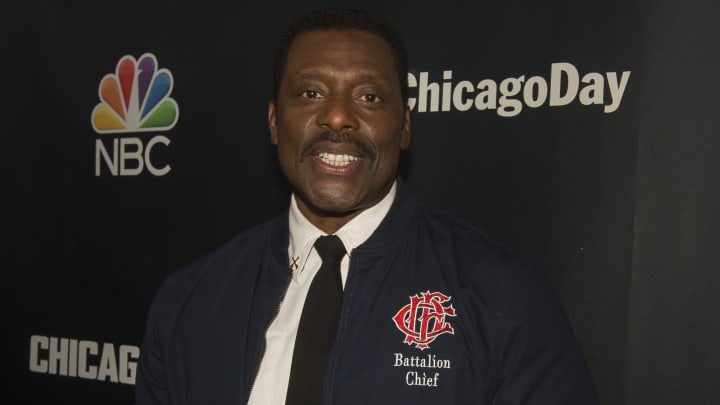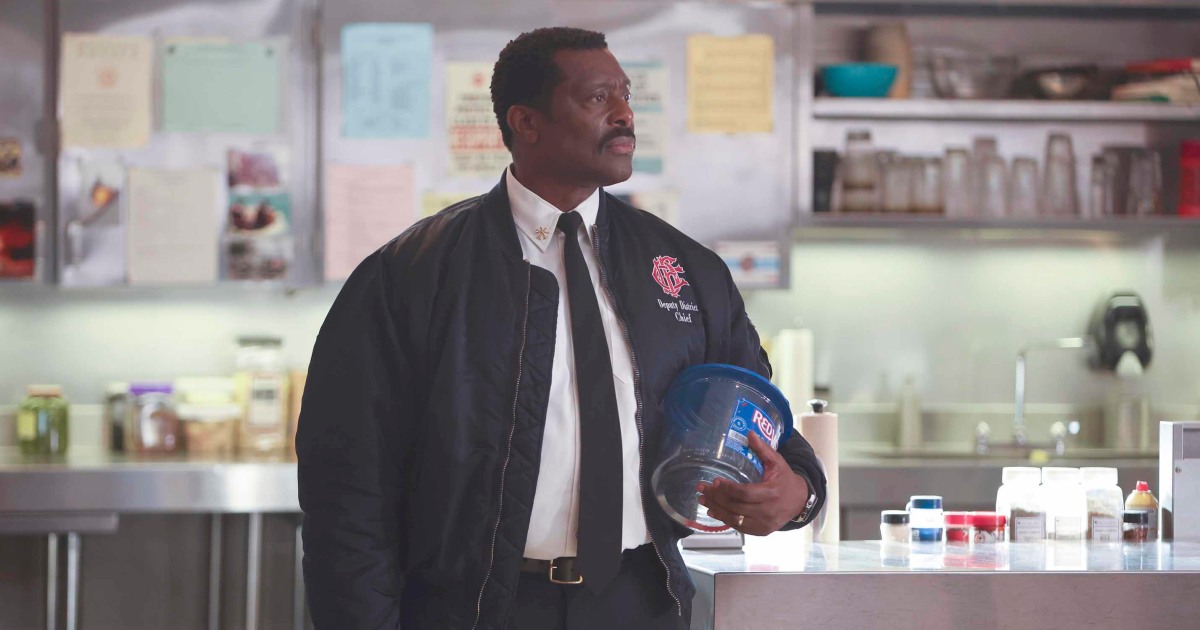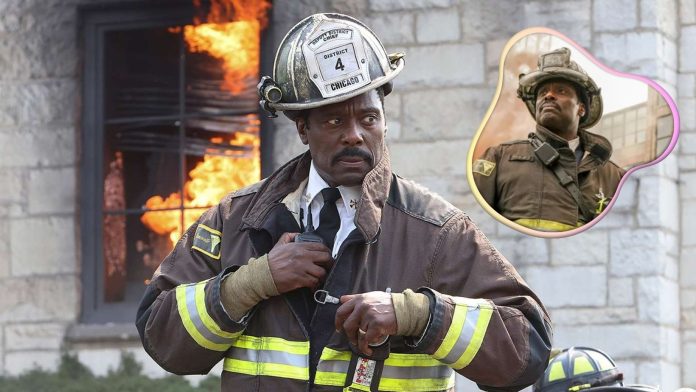- Eamonn Walker is leaving “Chicago Fire” after 12 seasons, with his character Wallace Boden expected to return in a recurring role.
- The character’s departure is not permanent, and he will make appearances in future seasons.
- Boden’s character has been a significant part of the show, appearing in the “Chicago P.D.” and “Chicago Med” spinoffs.
- The show has been renewed for a 13th season, with no announced premiere date.
Newsypeople- Eamonn Roderique Walker, born on June 12, 1962, in London, England, is a distinguished English actor celebrated for his versatile performances across film, television, and theater. Walker’s acting career took off in the 1980s, marked by significant roles in television series such as “In Sickness and in Health,” “The Bill,” and “Supply & Demand.” He achieved widespread recognition and critical acclaim for his compelling portrayal of Kareem Said in the HBO series “Oz,” which showcased his profound acting abilities.
Walker’s career has been transatlantic, featuring roles in movies like “Unbreakable,” “Lord of War,” and “A Lonely Place to Die.” Initially trained as a dancer, Walker shifted to acting following a leg operation, a transition that highlighted his dedication to the performing arts. He has been married to Sandra Walker for decades, and they share three children, including twins Jahdine and Deke.

Eamonn Walker has made a significant impact on American television, especially through his role in “Oz,” which has been pivotal in shaping the landscape of U.S. television. His ability to deliver deeply engaging performances and portray complex characters has cemented his status as a respected and talented actor in the industry.
Also Read: Ella Purnell Big Eyes: Suffered Anxiety And Depression
Eamonn Walker Leaves ‘Chicago Fire’ After 12 Seasons
Eamonn Walker, known for his role as Battalion Chief Wallace Boden, is leaving “Chicago Fire” after 12 seasons. Walker has been a pivotal character since the show’s inception in 2012, and his departure marks a significant change for the series. His character, Boden, has been integral to the storyline, often serving as a father figure and leader within the Firehouse 51 team.
The decision for Boden’s exit is set to unfold in the season 12 finale, where it is hinted that he will make a critical decision affecting his career trajectory, specifically the race for Deputy Commissioner. This finale is also expected to address other character developments and provide closure to ongoing story arcs. Notably, the episode will touch on personal challenges faced by other characters, such as Carver and Damon, and Mouch’s adjustment to changes within the truck team.
EXCLUSIVE: ‘Chicago Fire’ original cast member Eamonn Walker is stepping away from his series regular duties on the hit NBC series after 12 seasons portraying boss Wallace Boden, Deadline has learned https://t.co/rUuiDzcLfJ pic.twitter.com/y1QPADVw3r
— Deadline Hollywood (@DEADLINE) May 7, 2024
Walker’s departure is not framed as a permanent goodbye. Reports suggest that while Boden will not be killed off, there is potential for him to return in a recurring capacity, leaving the door open for future guest appearances. This approach allows the show to retain ties with one of its original characters, maintaining continuity and emotional ties for the audience.
The exit of Walker follows other recent departures from the show, including Rome Flynn and Kara Killmer, indicating a period of significant transition for the series. These changes are part of broader narrative developments and cast rotations that often occur in long-running series like “Chicago Fire.”
As “Chicago Fire” prepares to bid farewell to one of its foundational characters, the show continues to evolve, introducing new characters and exploring new storylines while honoring the legacy of those who have been pivotal to its success over the past decade.
Eamonn Walker’s Decision To Leave “Chicago Fire” Explained
Eamonn Walker’s decision to leave “Chicago Fire” after 12 seasons as Wallace Boden appears to be a personal choice, influenced by a variety of factors. While specific reasons for his departure are not known, several elements contribute to the context of his exit:
- Personal and Professional Growth: As with many long-term roles, actors often choose to explore new opportunities or shift their focus after many years with one character. This seems to be a factor for Walker, as stepping down to a recurring role allows him more flexibility while still maintaining a connection to the series.
- Series Dynamics and Cast Changes: “Chicago Fire” has seen several cast changes over its run, which might influence decisions by remaining original cast members about their own futures on the show. The departure of other key characters and changes in the storyline dynamics often lead to shifts in the cast structure.
- Continued Involvement in a Limited Capacity: Walker’s transition to a recurring role rather than a complete departure suggests a desire to stay connected to the series without the demands of a full-time commitment. This allows him to remain part of the story while potentially working on other projects.
- Narrative Development: In-universe, Boden’s career progression within the firefighting hierarchy might naturally lead to less frequent appearances on the show, aligning with a narrative reason for less screen time.

Overall, while the exact motivations behind Walker’s decision are not publicly detailed, the combination of seeking new challenges, changes within the show’s cast, and the opportunity to maintain a presence in a beloved role likely influenced his decision to step back from a full-time commitment to “Chicago Fire.”
Eamonn Walker Acting Career And Achievement Explored
Walker’s journey into acting began with a passion for dance, joining London’s Explosive Dance Theatre Company. However, an injury led him to shift his focus to acting, inspired by Sidney Poitier’s performance in “In the Heat of the Night.” His stage debut was in the ensemble of “Labelled with Love,” a production based on the music of the band Squeeze. This early experience solidified his love for theater, which remained a significant part of his career.
In 2007, Walker made a significant mark on the stage by becoming the first Black actor to play the titular role of Othello at the original or the reconstructed Globe Theatre. This achievement was not only a testament to his acting prowess but also a milestone in the representation of Black actors in classical theater. Additionally, he played Marc Antony in Belasco Theatre’s production of “Julius Caesar,” sharing the stage with Denzel Washington, further cementing his reputation as a Shakespearean actor.
Television Roles
Walker’s television career began with guest appearances in series like “Dempsey and Makepeace” and “In Sickness and in Health.” His breakthrough role came in the British detective series “The Bill,” where he played P.C. Haynes in Seasons 4 and 5. Throughout the 90s, he continued to build his television profile with appearances in series such as “Bergerac,” “Love Hurts,” “One Foot in the Grave,” and “The Detectives.” He also starred in both seasons of the British prison drama “The Governor” as Snoopy Oswald.

In 1997, Walker’s career took a significant turn with his role as Kareem Said in the HBO series “Oz,” for which he won a CableACE Award. This role not only solidified his status as a leading actor but also brought him international recognition.
Film and Further Television Roles
Walker’s film career includes notable appearances in “Young Soul Rebels” (1991), “Once in the Life” (2000), “Legacy” (2010), and “A Lonely Place to Die” (2011). His versatility as an actor is evident in his ability to transition seamlessly between different genres and mediums.
Since 2012, Walker has starred as Wallace Boden in the NBC drama “Chicago Fire” and its spinoffs, showcasing his commitment to long-running roles that allow him to develop complex characters over time.
Activism and Philanthropy
Beyond his acting career, Walker is a dedicated activist and philanthropist, actively involved in various charitable causes, particularly those focusing on healthcare and education. His involvement in these areas reflects his broader commitment to using his platform to address important social issues.



